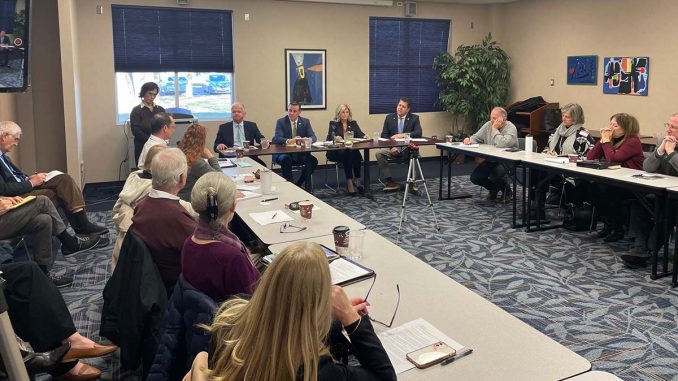
For at least the 20th time — no one present seemed to know just when it all began — state legislators convened for an environmental roundtable in Riverhead last Thursday.
This one was hosted by state Sen. Anthony Palumbo (R-New Suffolk) and included Assembly members Fred Thiele (D-Sag Harbor) and Jodi Giglio (R-Riverhead), Congressman Nick LaLota (R-Amityville) and Southold Supervisor Al Krupski, along with an all-star list of environmentalists and advocates from several dozen organizations that focus on the wellbeing of eastern Long Island.
“A lot of very good ideas have come out of this roundtable over the years,” Mr. Thiele said as everyone took their seats at tables set up in a large rectangle. (A running joke during the two-hour meeting was that the table wasn’t round.) “Every year we have done this has been beneficial for us.”
The first environmental roundtable was convened by state Sen. Ken LaValle, who retired in 2020 after 44 years in state government. Referring to his senate district, one of Mr. LaValle’s popular slogans was “First District First.” Last year’s roundtable focused on water quality, coastal erosion and preserving open space, but the bulk of the discussion centered on waste management and affordable housing.
Mr. LaValle was not present last Thursday, but was fondly remembered for holding these events with local environmental groups. By the end of the gathering, held at the Suffolk Community College Culinary Arts and Hospitality Center in Riverhead, it had become a punchline as to when Mr. LaValle started them. Best guesses were more than 25 years ago.
Mr. Palumbo set the tone at the start, asking participants to introduce themselves and who they represent and list topics that concerned them most. Groups represented included the Peconic Estuary Program, Group for the East End, Pine Barrens Society, Peconic Land Trust and Long Island Farm Bureau.
“The benefit of this roundtable is to have all the stakeholders in the same room,” Mr. Palumbo said.
Peconic Land Trust president John Halsey named the preservation of the East End’s disappearing prime farmlands as a focus of local efforts. He also spoke of the need to identify and preserve known Indigenous burial grounds.
Mr. Palumbo agreed. “We sponsored the recognition bill for the Montaukett Nation,” he said. “It was unanimous in both houses but was vetoed by the governor. We are asking for that recognition to be reinstated. It was taken from them.”
A number of speakers raised the issue of water quality and whether the expansion of sewage treatment facilities would have the detrimental side effect of promoting density.
Former state assemblyman Steven Englebright said, “The real task before us is to strike a balance between needed infrastructure and preserving wooded recharge areas like the Pine Barrens. And also to have infrastructure for downtowns like where we are right now.”
Several speakers, including Mr. Palumbo, Mr. Halsey and Mr. Krupski, focused on land preservation as the No. 1 priority of the Community Preservation Fund. “We need to keep our eye on that ball,” Mr. Palumbo said.
Mr. Krupski pointed out at the environmental roundtable that there are approximately 8,000 acres of farmland on the North Fork that need to be preserved. “But we are in a footrace with people who have other plans besides preservation,” he said. “Land preservation seems to have fallen off as an important topic. It’s a lot cheaper to preserve the land and not build all the infrastructure.”
He also spoke about the need for state support to sharply reduce populations of both deer and geese across the region.
“We plant a cover crop and the geese are destroying it,” Mr. Krupski said. “The fields are filled with geese. And without a cover crop you get soil erosion. Extending the season for goose hunting would be a big help.”
A number of speakers brought up coastal resiliency, sea level rise and the now-common flooding that occurs in low-lying hamlets. Other topics included the dark sky movement, what to do with the millions of tons of garbage generated yearly, how to promote composting and whether New York State should ban the harvesting of horseshoe crabs, as Connecticut has done.
Mr. LaLota spoke about his own efforts at the federal level to preserve the entirety of Plum Island, which sits east of Orient Point and is the home of a soon to be shuttered federal animal research lab.
“We want to see the island preserved for generations to come,” he said. “I put in the Plum Island Preservation Act. We should enshrine into federal law the future of Plum Island.”

